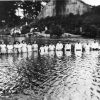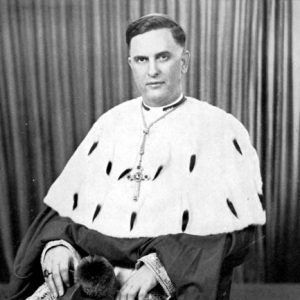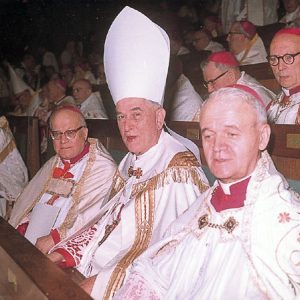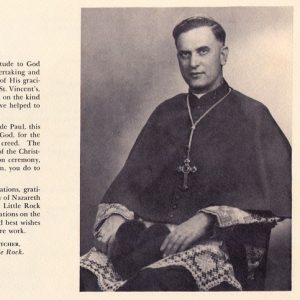calsfoundation@cals.org
Albert Lewis Fletcher (1896–1979)
Albert Lewis Fletcher was the fourth bishop of the Diocese of Little Rock, the only Catholic diocese for the state of Arkansas. He was the first native Arkansan ever to be raised to the rank within the American Catholic episcopacy, and he oversaw Arkansas Catholicism during an era of unprecedented growth and upheaval.
Albert Fletcher was born on October 28, 1896, the oldest of four children, to Thomas Fletcher, a physician, and Helen Wehr in Little Rock (Pulaski County). Around the time of their marriage, both parents converted to Catholicism, his father being a former Episcopalian and his mother a former Lutheran. Within a few months of his birth, the family moved first to Paris (Logan County) and then to Tontitown (Washington County). When Albert entered the now defunct Little Rock College in 1912, the family had relocated to Mena (Polk County). Fletcher graduated from Little Rock College in 1917 with a BA in chemistry, yet he immediately entered St. John’s Seminary in Little Rock to prepare for the priesthood. Bishop John B. Morris ordained him in Little Rock on June 4, 1920.
Bishop Morris sent Fletcher to the University of Chicago, where the young cleric earned a master’s degree in chemistry in 1922. He returned to Little Rock College, teaching chemistry, and a year later, he became president of this small Catholic college (which closed in 1930). In 1926, he became chancellor for the Diocese of Little Rock; he was appointed vicar general by 1933. A year later, Pope Pius XI gave him the honorary title of monsignor. In 1939, Bishop Morris petitioned the Vatican to make Fletcher his auxiliary bishop. Rome acceded to this request, and so on April 25, 1940, Albert L. Fletcher became the first native Arkansan to be elevated to the American Catholic hierarchy.
As auxiliary bishop, Fletcher ran the day-to-day operations of the diocese for the ailing Bishop Morris. When Morris died on October 22, 1946, since he was just an auxiliary bishop, it was not automatic that Fletcher would be the new bishop. On December 11, 1946, Fletcher was informed that Pope Pius XII named him Arkansas’s next bishop; he was consecrated the state’s fourth Catholic prelate at St. Andrew’s Cathedral on February 11, 1947.
Fletcher was a tall, soft-spoken, genial man who would serve as bishop during a turbulent era. In the early part of his episcopacy, a Catholic bookstore opened in Little Rock, St. John’s Seminary enlarged, and St. Vincent Infirmary moved to its present location. By 1960, the number of Catholics in Arkansas was over two percent for the first time in the state’s history.
A major storm erupted over the racial integration of the Little Rock public schools system from 1957 to 1959. While often slow and cautious, Fletcher opposed racial bigotry and supported the peaceful integration of the schools. He even wrote a catechism in 1960, in which it was stated that racial hatred and segregation were immoral, as they violated both justice and charity. Bishop Fletcher oversaw the integration of Catholic schools and hospitals across the state. One consequence of this policy was the closing four parochial schools and seven parishes serving African Americans between 1962 and 1972.
Bishop Fletcher attended the Second Vatican Council held in four fall sessions from 1962 to 1965. While he never addressed the council, he wrote thirteen interventions or amendments, nine of which were accepted by the Council. While much of the Catholic world was soon in an uproar over the interpretation and implementation of the Council decrees, Fletcher also faced dissension and turmoil within the St. John’s Seminary in Little Rock. The young faculty at the seminary was far more liberal than most Arkansas Catholics and the bishop at the time. Father James F. Drane, a theologian at St. John’s Seminary, wrote a series of articles in the Little Rock-based Arkansas Gazette in the summer, questioning not only the Church’s position against artificial contraception but also stating that he hoped to overthrow the “myth” of papal infallibility. Bishop Fletcher suspended him from priesthood in 1966; Drane then appealed to the Vatican, which backed the Arkansas bishop’s suspension of the priest. Even before he heard back from the Vatican regarding Drane, Fletcher abruptly closed the seminary during the summer of 1967. These grounds now became the main administrative offices for the diocese.
Like Bishop Morris before him, Fletcher asked for an auxiliary bishop, and upon his recommendation, the Vatican named Lawrence P. Graves to that position on April 25, 1969. Graves would be the second native Arkansan raised to the rank of the hierarchy. New rules required the bishop to resign upon reaching the age of seventy-five, so Fletcher submitted his resignation in January, 1972. News came the following summer that Monsignor Andrew J. McDonald of Savannah, Georgia, would succeed Fletcher as Arkansas’s next Catholic prelate. In 1973, Auxiliary Bishop Lawrence P. Graves left Arkansas to become the Bishop of Alexandria, Louisiana.
Bishop Fletcher continued to live at his home in Little Rock until his health began to fail. In the fall of 1979, he was moved to the rectory next to the St. Andrew’s Cathedral. On December 6, 1979, he drove to the chancery on an errand. While driving back to the cathedral, Fletcher stopped at a local diner. There, he suddenly collapsed and was rushed to St. Vincent Infirmary, where he died of an apparent heart attack. He was buried along with his predecessors in the crypt under the Cathedral of St. Andrew.
For additional information:
Bishop Albert Lewis Fletcher Papers. Archives of the Diocese of Little Rock. St. John’s Catholic Center, Little Rock, Arkansas.
Woods, James M. Mission and Memory: A History of the Catholic Church in Arkansas. Little Rock: August House, 1993.
James M. Woods
Georgia Southern University









Comments
No comments on this entry yet.